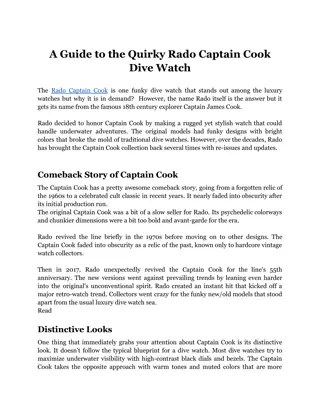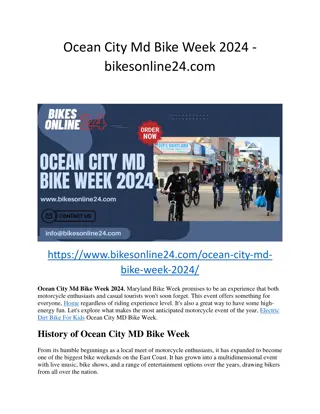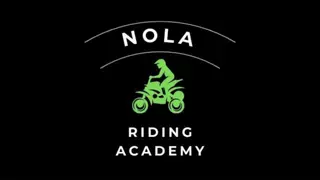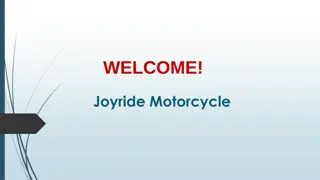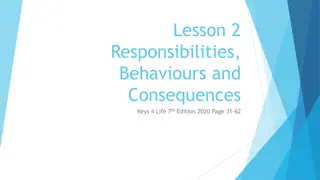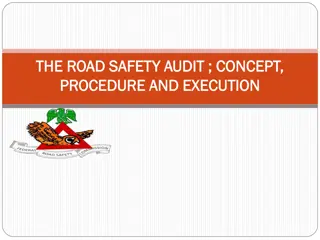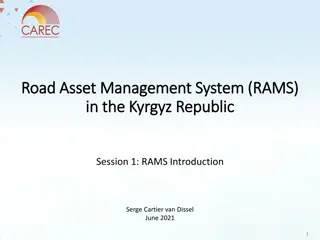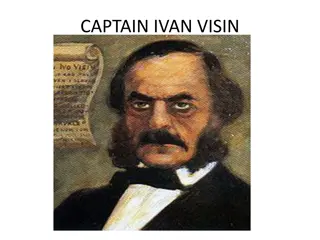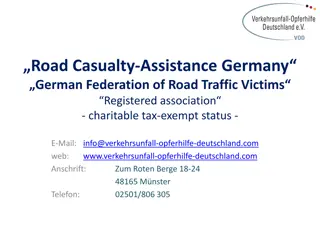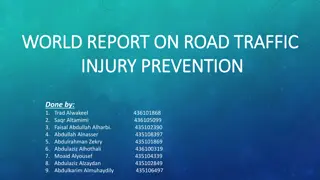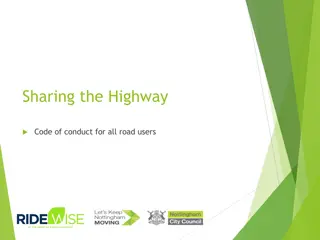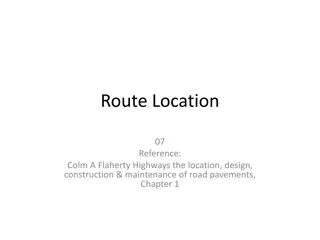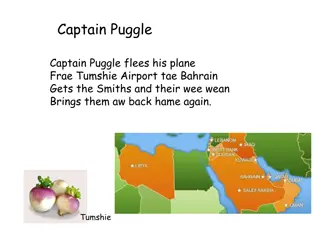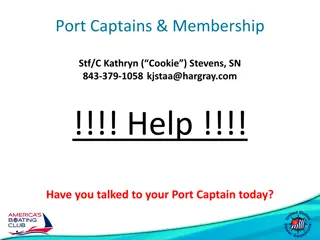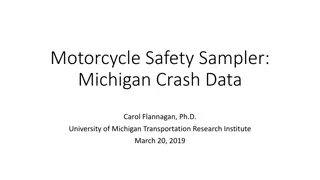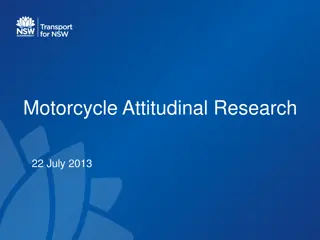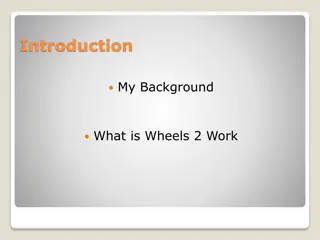Road Captain Responsibilities and Essentials for Safe Motorcycle Group Riding
The role of a Road Captain in motorcycle group rides involves leadership and accountability for pack safety. This includes route planning, pre-ride briefings, pack management, safety enforcement, and adherence to H.O.G. and Chapter policies. Essential tools include a camera, first aid kit, mobile phone, notepad, pens, basic toolkit, road captain notebook, route maps, and trip itinerary. Planning and reviewing the route, recognizing potential problem areas, using GPS for navigation, and ensuring safe riding practices are crucial aspects of being a Road Captain.
Download Presentation

Please find below an Image/Link to download the presentation.
The content on the website is provided AS IS for your information and personal use only. It may not be sold, licensed, or shared on other websites without obtaining consent from the author. Download presentation by click this link. If you encounter any issues during the download, it is possible that the publisher has removed the file from their server.
E N D
Presentation Transcript
1 H.O.G. ROC SRST Courses - 2020
THE ROAD CAPTAIN ROAD CAPTAIN OBLIGATIONS ROAD CAPTAIN ESSENTIALS ROUTE PLANNING RIDE DAY VERIFICATIONS PRE RIDE BRIEF PACK MANAGEMENT REST & DESTINATION STOPS POST RIDE REPORTS RIDING WEATHER RIDE CANCELLATION INDEMNITY LIABILITY ADVICE 2
The Road Captain is the leader of a group of motorcyclists riding is a pack. Being a Road Captain can be exciting and rewarding but it's more than just a patch, it comes with a serious obligation and accountability for Pack Safety. The Road Captain : Displays leadership Is responsible and focused on pack safety Is respectful to all Does not tolerate: Recklessness, carelessness of foolishness 3 HOG Johannesburg SRST Courses - 2012
The leader of a group of motorcyclists on a ride. Must have a Valid License Promotes safe riding practices. Insures pack safety between travel points. Insure that riders operate their motorcycles in a safe manner. Maintains control of the group. Resolves problems promptly and tactfully. Enforces H.O.G. and Chapter policies on riding (e.g. alcohol policy). Makes sure all Marshals are briefed on route and plan for the day. 4
Camera, First Aid Kit, Mobile Phone, Notepad, Pens, Basic Toolkit. Road Captain Notebook. Route Map & Road Maps. Trip itinerary with information. All releasee and injury report forms. Your personal info. Pre-ride briefing sheet and this guide (to Marshals + Group). 5
Plan and review the intended route. Recce the route Determine rest, fuel, food and point of interest stops. Plan fuel stops to accommodate smallest tank. Identify potential problem areas Road construction and detours. Poor parking at intended stops. Review weather reports before ride and monitor weather during ride. Use map software to create a map with directions for posting to the website, Facebook, Marshals on duty, etc. 6
A GPS is a beneficial tool and a good investment Trip entry waypoints Allows you to see upcoming turns (3-5km rule). Very helpful in re-routing. Hotels, restaurants, petrol stations, ATMs, banks, etc. H-D dealerships. 7
Assess the group, noting the motorcycles, riders and pillions. Identify new or inexperienced riders Move inexperienced riders behind the Pack Leader Show up at least 30 before the ride. Make sure everyone signs in to verify indemnity. Note: Motorcycles with limited fuel capacity. Motorcycles with potential for mechanical failure or safety problems. Ensure the Marshal s, Sweep, Safety, Pack Leader and Biker Buddy s are present. 8 .
Verify all the legal forms are signed. Explain the ride, destination, stops and any technical portions. Identify Marshals, Sweep, Safety, Pack Leader and Biker Buddies Use the Pre-Ride Briefing Worksheet !!! Note if there has been a separation for an extended period of time : Find a safe place to pull the group off the road. Send a scout back to investigate. Decide whether to wait, continue to next stop or cancel. . 9
Pull out from the staging area when all riders are ready Maintain a steady speed to prevent yo-yoing within the group. Use cruise control whenever possible. Never make erratic or sudden moves or stops. Obey all traffic laws, signs and traffic control devices. Be alert and signal the group when road hazards are encountered. Be aware of what is happening within the group. 10
If you miss a turn or get lost, continue riding until you find a safe location to pull the group over. Inform the group, assess the situation on how to get back on route then inform the riders of the new plan. When passing ensure there is a safe distance between the group and oncoming traffic. Ensure riders know the rules and what to expect in a passing sequence. Rely on the Sweep and the other Road Marshals. 11 HOG Johannesburg SRST Courses - 2012
When passing ensure there is a safe distance between the group and oncoming traffic. Ensure riders know the rules and what to expect in a passing sequence. Look as far down road as possible and be aware of lane collapse. No bumper diving Riders that leave the group can re-join at next scheduled stop or with the assistance of a Road Marshal. Keep group tight in traffic to avoid fragmentation. Single file in tight turns, cyclists, vehicles parked on shoulders, hazard situations, passing. 12 HOG Johannesburg SRST Courses - 2012
Try to park all bikes together. Left turn into and out of the stop area is preferred to avoid oncoming traffic. Avoid gravel, dirt or hills when stopping. Ask other Road Captains, Safety Officer, for help in dealing with problems if necessary. 14 HOG Johannesburg SRST Courses - 2012
Once you have reached your rally destination: Ensure that the following reports are accumulated Gather all injury reports, minor and adult waivers, membership enrolment forms, and the list of all participating members from the Biker-Buddy. 15 HOG Johannesburg SRST Courses - 2012
Once you have reached your rally destination: Ensure that the following reports are accumulated Injury reports, Minor and adult waivers, The list of all participating members from the Biker-Buddy. 16 HOG Johannesburg SRST Courses - 2012
Sunny, temperate and dry weather is preferred. We may ride in light rain Avoid rain storms if possible Check with the group if they would like to continue on the planned route or if an alternate shorter route is preferred We ride in cold weather Be aware of Black Ice. Do not ride in Snow or Sleet, We ride in wind of not a severe storm 17 HOG Johannesburg SRST Courses - 2012
Rallies: If there are severe storms predicted, notify the group by 18:00 on the day before the Rally Planned breakfast ride: If there is unpredicted bad weather, notify the group by 06:00 on the day of the ride If no one has pitched for a ride , the ride will be cancelled 20min past the scheduled ride time Post ride cancellations on the Chapter Broadcast group. 18 HOG Johannesburg SRST Courses - 2012
Have everyone sign the Indemnity forms Get waivers from all non-chapter riders (No waiver- No Ride). Get waivers for all minors with parent or legal guardian's signature. Ride and perform Road Captain duties as reviewed in this document. Complete Injury and Accident Report Forms promptly. Keep problem riders from riding within the group. 19 HOG Johannesburg SRST Courses - 2012
What is it ? Responsibility for an action. Places blame. Who is liable ? Road Captain Safety Officer Director 20 HOG Johannesburg SRST Courses - 2012
Will cover you as long as you are acting within the scope of your duties. Obey all traffic laws and traffic control devices or instructions by a Road Marshal. Does not cover punitive damages (Meant to be paid by an individual as punishment for negligence). 21 HOG Johannesburg SRST Courses - 2012
You are the decision maker and have final say so make sure you're willing to make the hard calls regarding group conflict and rider safety. No alcohol - no exceptions. Dismiss riders that disobey this rule. Keep an eye out for careless riders or inexperienced riders possibly putting the group at risk. Do not tolerate bad attitudes. Be assertive with your decisions, but without being rude. Get input and support from your Safety Officer and other Road Marshals on the ride. 22 HOG Johannesburg SRST Courses - 2012
You are the leader Everyone will look to you for leadership. You are responsible for everyone's safety Ride smart, think ahead, look ahead, be alert at all times. Expect the unexpected and deal with it decisively If you're tired stop ! Safety is the #1 priority, Don't push it and possibly jeopardize the safety of others. Ask assistance from a Senior Road Marshal or a Road Captain that is present. 23
EXPECT THE UNEXPECTED Make sure you're mentally capable of dealing with potential illness or accidents. You must be capable confidently of riding in: Extreme heat, cold, thunderstorms and wind Possibly all in the same day ! 24
25 H.O.G. ROC SRST Courses - 2020




